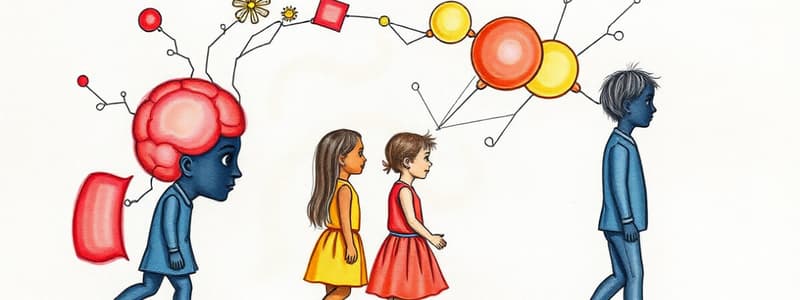Podcast
Questions and Answers
Which theorist is best known for their stages of psychosocial development?
Which theorist is best known for their stages of psychosocial development?
- Jean Piaget
- Sigmund Freud
- Lev Vygotsky
- Erik Erikson (correct)
According to Piaget, object permanence develops during which stage?
According to Piaget, object permanence develops during which stage?
- Concrete operations
- Sensorimotor (correct)
- Preoperational
- Formal operations
Which of these is NOT considered a teratogen?
Which of these is NOT considered a teratogen?
- External environmental factors
- Infections
- Separation anxiety (correct)
- Maternal metabolic diseases
In Erikson's theory, what is the primary conflict faced during infancy?
In Erikson's theory, what is the primary conflict faced during infancy?
Which of the following best describes observational learning?
Which of the following best describes observational learning?
What is the Zone of Proximal Development (ZPD) most closely related to?
What is the Zone of Proximal Development (ZPD) most closely related to?
Which of the following is a typical emotional development seen in infants?
Which of the following is a typical emotional development seen in infants?
Temperament is best described as:
Temperament is best described as:
Which is a characteristic of physical development in toddlers?
Which is a characteristic of physical development in toddlers?
According to Skinner, learning is best achieved through which approach?
According to Skinner, learning is best achieved through which approach?
According to Piaget's stages of cognitive development, which stage is characterized by logical thinking and an understanding of reversibility?
According to Piaget's stages of cognitive development, which stage is characterized by logical thinking and an understanding of reversibility?
Which theorist emphasized the importance of social interaction and culture in cognitive development, highlighting concepts like the Zone of Proximal Development (ZPD)?
Which theorist emphasized the importance of social interaction and culture in cognitive development, highlighting concepts like the Zone of Proximal Development (ZPD)?
According to Maslow's hierarchy of needs, which needs must be met for babies before they can progress to other stages?
According to Maslow's hierarchy of needs, which needs must be met for babies before they can progress to other stages?
Which reflex is characterized by the turning of an infant's head when their cheek is stroked?
Which reflex is characterized by the turning of an infant's head when their cheek is stroked?
Parallel play, where children play alongside each other without significant interaction, is most commonly seen during which developmental stage?
Parallel play, where children play alongside each other without significant interaction, is most commonly seen during which developmental stage?
What is 'centration' according to Piaget's preoperational stage?
What is 'centration' according to Piaget's preoperational stage?
Which of the following is a key characteristic of the formal operational stage in Piaget's theory?
Which of the following is a key characteristic of the formal operational stage in Piaget's theory?
Which stage of Kohlberg's theory involves acting based on one's own values and ethics rather than external expectations?
Which stage of Kohlberg's theory involves acting based on one's own values and ethics rather than external expectations?
Which of Gardner's multiple intelligences involves the ability to play an instrument or recognize musical patterns and rhythms?
Which of Gardner's multiple intelligences involves the ability to play an instrument or recognize musical patterns and rhythms?
Which of the following best describes the concept of 'personal fable,' relating to Elkind's concept of adolescence?
Which of the following best describes the concept of 'personal fable,' relating to Elkind's concept of adolescence?
What is the main developmental task of adolescents according to Erikson's theory?
What is the main developmental task of adolescents according to Erikson's theory?
Which of the following best reflects Havighurst's developmental task of adolescence?
Which of the following best reflects Havighurst's developmental task of adolescence?
According to Gilligan's theory on moral development, what characterizes the morality of care?
According to Gilligan's theory on moral development, what characterizes the morality of care?
Which physical changes occur earlier in females during adolescence?
Which physical changes occur earlier in females during adolescence?
According to LaBouvie-Vief's theory, what characterizes the postformal stage of cognitive development in adults?
According to LaBouvie-Vief's theory, what characterizes the postformal stage of cognitive development in adults?
Flashcards
Object permanence
Object permanence
The ability of a baby to understand that an object still exists even when it's out of sight.
Sensorimotor stage
Sensorimotor stage
Stage in Piaget's theory where infants learn through their senses and motor movements.
Attachment
Attachment
A strong emotional bond between an infant and their caregiver.
Separation anxiety
Separation anxiety
Signup and view all the flashcards
Teratogen
Teratogen
Signup and view all the flashcards
Trust vs. Mistrust
Trust vs. Mistrust
Signup and view all the flashcards
Zone of Proximal Development (ZPD)
Zone of Proximal Development (ZPD)
Signup and view all the flashcards
Operant Conditioning
Operant Conditioning
Signup and view all the flashcards
Observational learning
Observational learning
Signup and view all the flashcards
Hierarchy of Needs
Hierarchy of Needs
Signup and view all the flashcards
Concrete operational stage
Concrete operational stage
Signup and view all the flashcards
Formal operations stage
Formal operations stage
Signup and view all the flashcards
Meta-cognition
Meta-cognition
Signup and view all the flashcards
Identity vs. Role Confusion
Identity vs. Role Confusion
Signup and view all the flashcards
Generativity vs. Stagnation
Generativity vs. Stagnation
Signup and view all the flashcards
Puberty
Puberty
Signup and view all the flashcards
Internalization
Internalization
Signup and view all the flashcards
Egocentrism
Egocentrism
Signup and view all the flashcards
Personal fable
Personal fable
Signup and view all the flashcards
Imaginary audience
Imaginary audience
Signup and view all the flashcards
Kohlberg's stages of moral development
Kohlberg's stages of moral development
Signup and view all the flashcards
Postformal thinking
Postformal thinking
Signup and view all the flashcards
Emotional regulation
Emotional regulation
Signup and view all the flashcards
Study Notes
Introduction
- Collaborative Final Exam Review is a study guide for an exam.
- It covers people, physical, cognitive/intellectual, and emotional/social development across various ages.
Infants and Toddlers
- People/Theories: Includes Freud's 5 stages, Piaget's stages, Erikson's 8 psychosocial stages, Pavlov's classical conditioning, Skinner's operant conditioning, Watson's experiment, Bandura's observational learning, Maslow's hierarchy of needs, Rogers' fully functional person, Vygotsky's ZPD, and Kohlberg's stages of moral development. Bronfenbrenner's ecological systems theory and Rogoff's learning by observing are also noted.
- Physical: Teratogens (agents causing malformation), maternal metabolic diseases, infections, and diseases impacting the mother, as well as different reflex types (Palmar, Plantar, Tonic neck, Sucking, Step, Moro/startle, Babinski, crawling, rooting) are listed.
- Cognitive/Intellectual: Early development includes responding to stimuli, facial expressions, coordination, play (peek-a-boo), and language (cooing, babbling).
- Emotional/Social: Attachment, stranger anxiety, separation anxiety, temperament, and control of emotions are discussed for infants. Relationships, language, emotions, and temperament for toddlers are further elaborated.
Early Childhood
- Piaget: Preoperational stage, intuition-based thinking.
- Vygotsky: Learning through social interaction, emphasizing imagination.
Middle Childhood
- Piaget: Concrete operational stage, logical thinking, understanding reversibility.
- Kohlberg: Preconventional morality (rewards) to conventional morality (good vs. bad).
- Gardner: Multiple intelligences.
- Vygotsky: Learning through social interactions, ZPD (Zone of Proximal Development). Learning through experiences.
Adolescence
- Piaget: Formal operations, abstract thinking, metacognition.
- Kohlberg: Levels of morality, internalization, and conventional reasoning; post-conventional moral development.
Early Adulthood
- Erikson: Identity vs. role confusion, important decisions, and finding who you are.
- Loevinger: Development of the ego, autonomy.
- Hall: Storm and stress, diverse behaviors.
- Elkind: Egocentrism, personal fable, imaginary audience.
- Havighurst: Developmental tasks for teens (healthy relationships, emotional and financial independence).
- Davis: Socialized anxiety, maturing through anxiety.
- Gilligan: Morality of care, relationships and care of others.
- LaBouvie-Vief: Post-formal stage. (combining Piaget's theory with other theories).
Middle Adulthood
- Physical decline: sleep disruptions, wrinkles, grey hair, brittle nails, sensory decline, loss of muscle mass & bone density, hormone changes—especially for females (perimenopause and menopause) & males (testosterone decline, reproductive ability decreases).
- Postconventional morality: Inductive and deductive reasoning, more diverse vocabulary.
- Generativity vs. stagnation: Leaving legacies and/ or living solely for self.
- Sandwich generation: caring for multiple generations.
- Empty nest syndrome: adapting after children leave home.
- Retirement: transitions and relationship/marriage adjustments.
Later Adulthood
- Sensory decline: Vision (cataracts, macular degeneration, glaucoma), hearing (presbycusis, tinnitus, general loss), taste, smell, touch, & sensitivity to temperature.
- Cognitive declines & brain functions: shrinking brain size affects processing speed and memory; there are varying theories to explain this (data overload, lost brain function).
- Non-normative aging: Dementia (including Alzheimer's disease, vascular dementia, Lewy body dementia, Frontotemporal dementia) as a category under aging that isn't considered typical.
- Aging in place vs care facilities: considerations of finances, social context, health needs, cultural norms, and geography.
Other Concepts
- Nature vs. nurture, continuity, discontinuity, pedagogy, andragogy, Assimilation, Accommodation, schemes.
- Parenting styles: helicopter, backbone, jellyfish.
- Discipline including use of love-withdrawal, power assertion, or induction or discipline.
- Attachment theory mutual bonds and connections between a child and caregiver.
- Language development, Executive Strategies.
Studying That Suits You
Use AI to generate personalized quizzes and flashcards to suit your learning preferences.




